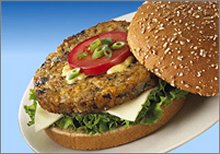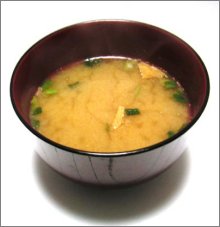Soy: Is It Healthy or Not? What the Experts Say
by www.SixWise.com
Soy is one of the most widely grown, and widely studied (over
5,000 research studies on soy exist) legumes in the world.
Here in the United States, you are likely familiar with soy
in the form of soymilk, soy burgers, soy ice cream and the
myriad of other processed soy products that claim to be ultra
healthy.
|

Soy burgers are touted as a healthy replacement for
meat burgers, but some experts say this type of processed
soy is far from a health food.
|
In truth, studies have shown that certain forms of soy can
help to:
-
Regulate blood sugar and blood pressure
-
Prevent colon, breast, and prostate cancers
-
Prevent atherosclerosis (hardening of the arteries)
-
Prevent hip fractures in post-menopausal women
Of course, soy wasn't always as popular as it is today. Soy
foods have traditionally been considered a "peasant"
food, and then a "hippie" food -- not something
that the average grocery shopper would even consider eating,
let alone purposely seek out.
Yet from 1992 to 2006, soy food sales have increased from
$300 million to $3.9 billion, according to the Soyfoods Association
of North America.
A large part of this increase came when the U.S. Food and
Drug Administration approved a health claim for soy foods
back in 1999 that said:
"Diets low in saturated fat and cholesterol that include
25 grams of soy protein a day may reduce the risk of heart
disease."
Soon after, Americans were clamoring to get their hands on
soy, in just about every form imaginable. But is it truly
healthy?
There is No Recommended Daily Amount of Soy Products
Despite findings that soy is good for your heart and your
bones, and may help to prevent cancer, no public health organization
in the United States has recommended a daily intake of soy
products. Not the National Cancer Institute, not the American
Heart Association and not the American Dietetics Association.
It seems that there is still a lot of conflicting evidence
on soy's impacts on your body, particularly in the way it
is consumed today: processed.
Traditionally, soy in Asian cultures was fermented before
eating. This not only makes the beans more digestible, it
increases their nutritive properties while decreasing the
presence of phytates, which prevent the absorption of minerals
including calcium, magnesium, iron and zinc.
Meanwhile, these cultures ate soy in much smaller quantities
(about 2 ounces a day) than Americans now eat soy. If you
have a glass of soymilk, you are already drinking more soy
than traditional cultures ate in a day. If you add to that
a soy burger and some soy ice cream, you are eating an extreme
amount of soy, the likes of which has never been consumed
in history.
Says Dr. Kaayla Daniel, author of The
Whole Soy Story:
"Unlike in Asia where people eat small amounts of whole
soybean products, western food processors separate the soybean
into two golden commodities--protein and oil. There's nothing
safe or natural about this.
Today's high-tech processing methods not only fail to remove
the anti-nutrients and toxins that are naturally present in
soybeans but leave toxic and carcinogenic residues created
by the high temperatures, high pressure, alkali and acid baths
and petroleum solvents."
In fact, processed soy foods like soymilk, soy meat products,
soy ice cream, soy energy bars, etc., have been linked to:
-
Malnutrition
-
Digestive problems
-
Thyroid dysfunction
-
Cognitive decline
-
Reproductive disorders
-
Immune system breakdowns
-
Heart disease
-
Cancer
Further, soybeans are one of the most common genetically
modified crops grown in the United States, and they are
one of the top
eight most allergenic foods.
|

Miso, a fermented soybean paste used to make miso soup,
is an example of a traditionally fermented, nutritious
soy product.
|
Soy Isoflavones: A Double-Edged Sword?
Another concern about soy foods has to do with soy isoflavones,
which are phytoestrogens,
a weak form of estrogen that could have a drug-like effect
in your body. It is a controversial issue, and some studies
suggest that high isoflavone levels might actually increase
the risk of cancer, particularly breast cancer.
Daniel Sheehan, Ph.D., director of the Estrogen Knowledge
Base Program at the FDA's National Center for Toxicological
Research, says isoflavones should be consumed "cautiously."
He says, "While isoflavones may have beneficial effects
at some ages or circumstances, this cannot be assumed to be
true at all ages. Isoflavones are like other estrogens in
that they are two-edged swords, conferring both benefits and
risks."
Which Soy Products ARE Healthy?
It seems the key to avoiding such health risks when it comes
to soy is to stick with only unprocessed varieties.
In fact, a study in the June 2004 issue of Carcinogenesis
found that processed soy products and supplements have a significantly
lower ability to prevent cancer, and may actually stimulate
the growth of pre-existing estrogen-dependent breast tumors,
compared with whole soy foods.
"These partially purified isoflavone-containing products
may not have the same health benefits as whole soy foods,"
said William G. Helferich, professor of food science and human
nutrition at the University of Illinois at Urbana-Champaign
and one of the study's lead authors.
The researchers suggested that it may be wise to avoid processed
soy products and supplements that contain isoflavones in more
purified forms, which is how many Americans consume soy.
Instead, they said to choose minimally processed whole soy
foods.
So if you're looking for a healthy way to eat and enjoy soy,
most experts agree that the following are truly healthy soy
options:
-
Edamame
-
Whole soy flour
-
Natto (fermented soybeans)
-
Miso (fermented soybean paste)
-
Tempeh (fermented soybean cake)
-
Naturally fermented soy sauce
Recommended Reading
The
6 Healthiest Staple Foods in Japanese Cuisine
The
Most Dangerous Toxin that Almost No One Knows About
Sources
Soyfoods
Association of North America
The
World's Healthiest Foods